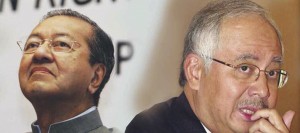By Liew Chin Tong
 It was the most dramatic weekend in our political history. It was a decade ago. Yet it feels like yesterday.
It was the most dramatic weekend in our political history. It was a decade ago. Yet it feels like yesterday.
At the closing ceremony of UMNO general assembly on 22nd June 2002, Dr Mahathir Mohamad announced his resignation unexpectedly with the ensuing tears, dramas and shocks vividly displayed on live national telecast.
The next morning, PAS president Dato’ Fadzil Noor passed away suddenly after being admitted to hospital for heart ailment. Hundreds of thousands flocked to his hometown in Kedah to bid farewell to the person who built the contemporary PAS.
Those events changed the course of Malaysian politics.
Dr. Mahathir was losing his political grip after he sacked his erstwhile protégé Dato Seri Anwar Ibahim, weakening his position. Despite winning the 1999 general election, the Mahathir administration drifted purposelessly between September 1998 when Anwar was sacked and the Lunas by-election on 29th November 2000 when Barisan Nasional was defeated at the previously safe multi-ethnic constituency in southern Kedah.
By December 2000, Dr. Mahathir was seen as a liability even within high level UMNO circles. But he fought back with authoritarian measures and a bit of luck as a result of the changed international environment post-911, aided as well as disunity among the opposition ranks.
In April 2001, key Anwar mobilizers were arrested under the Internal Security Act hence disarming the strongest challenge to Mahathir’s rule. Finance Minister Daim Zainuddin was seemingly asked to leave office, allowing Dr Mahathir to blame the financial excesses of the government on Daim alone, while assuming the portfolio of finance minister himself. This was a practice that both of his successors Tun Abdullah Badawi and Dato’ Seri Najib Razak continued.
On 22nd September 2001, DAP pulled out from the nascent Barisan Alternatif over the question of Islamic state, thus ending the possibility of a multi-ethnic coalition winning power from Barisan Nasional. On 29th September, Dr. Mahathir announced at Gerakan’s general assembly that Malaysia was already an Islamic state, turning the tables on PAS and forced the latter to search for a reply.
The September 11th attacks on the United States changed the international discourse instantly. Dr Mahathir was suddenly seen by his foreign critics as a pair of stable hands instead of the despot he was portrayed after Anwar’s jailing.
Only in late 2001 he began to recover politically.
So, by mid-2002, Dr. Mahathir was in a much comfortable position compared to just a year ago thanks to these confluence of events, some by design, others by default.
Dr Mahathir knew that he was the target of Malay dissent and hatred. Only by retiring from active politics could he save UMNO’s electoral fortune. The untimely demise of Fadzil Noor, PAS’ most gifted strategist and leader, unfortunately resulted in the party moving back to its old purist and conservative base, when Fadzil had actually steered the party to the middle ground and won the hearts and minds of urban Malays.
The 2004 general election which saw Abdullah Badawi win with 65 percent of votes and 91 percent of parliamentary seats were essentially decided by the fateful events in that June weekend.
Malaysians, especially younger, urban and better educated Malays, have been waiting for change that would make the country more open, inclusive and democratic as well as less corrupt at least since the early 1990s. Mahathir’s excesses were tolerated then because the economy was doing quite well and Anwar as Mahathir’s heir apparent was the face of a more tolerant future. But the future did not come, while the past never fades away.
The past is indeed still around and Malaysia continues to wait. A decade after that fateful weekend, the long shadow of Dr. Mahathir still looms large. He has contributed to the political demise of Tunku Abdul Rahman, Tun Hussein Onn and Tun Abdullah Badawi.
Mahathir has just begun calling Prime Minister Najib a weak leader which conceded too much to the opposition. Perhaps the political demise of Najib would come with the end of Barisan Nasional rule at once. -The Rocket



